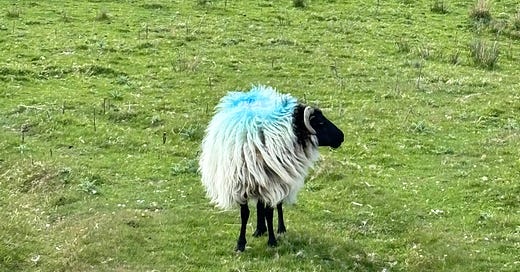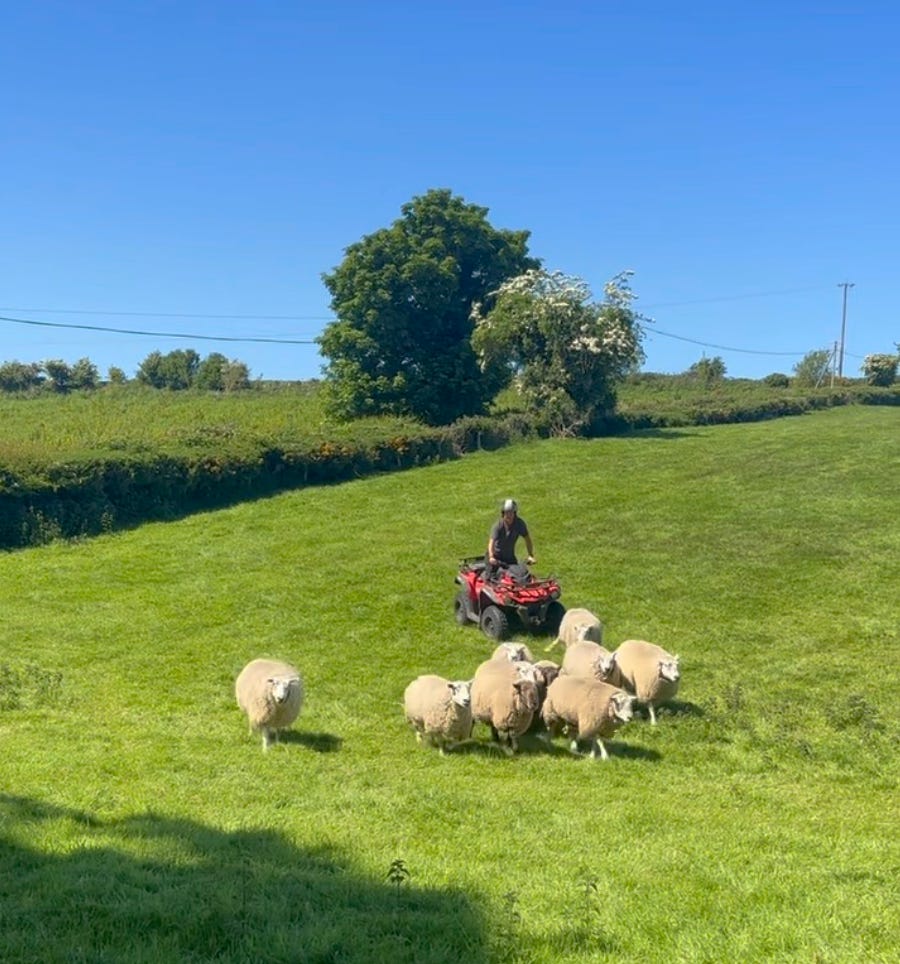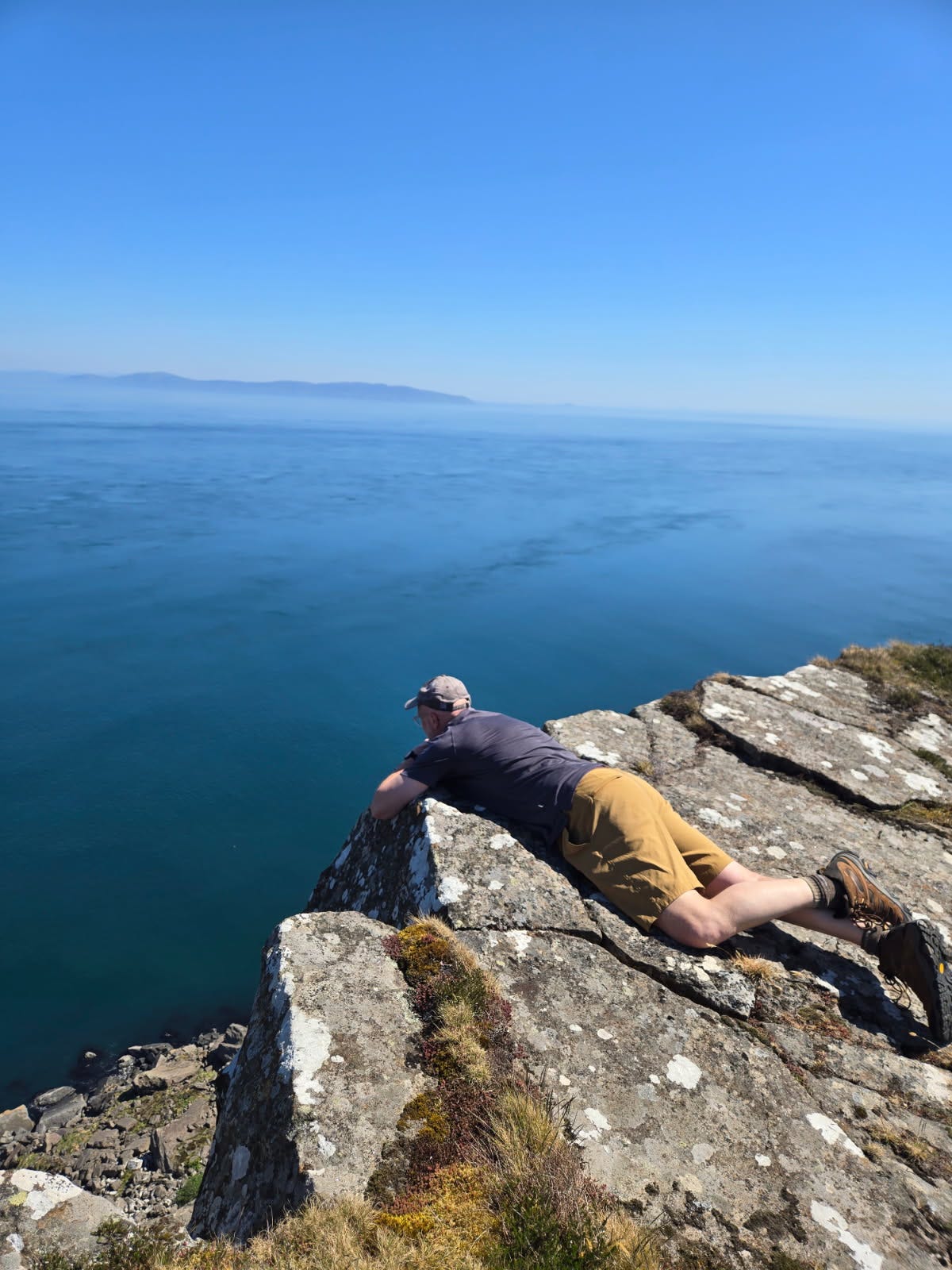Spirituality, Work, and AI
What moral challenges arrive when AI undercuts your job's meaningfulness? Let's speak to that question by telling some tales about hiking in Northern Ireland last week.
AI news in the job market's scary these days. I’d like to think with you about the spiritual challenges this tech innovation presents to our understanding of work.
BTW, you didn’t get a Mode/Switch last week, because my wife & I were hiking along the coast of Northern Ireland from Ballycastle to Port Stewart. All the pics below are from that very good trip.
I wasn’t expecting to see sheep rocking Slurpee Blue in a pasture on Rathlin Island.
One afternoon, hiking towards Ballycastle, my wife and I came across a shepherd leaning against a fence, staring off across a pasture. He was carrying a crook, which felt on brand for his occupation. But he was also wearing a florescent construction vest and cargo shorts, which didn’t quite comport with my Wordsworthian picture of pastoral calm. To add to the incongruity, across the field, another shepherd was racing a four-wheeler in and around a herd of sheep. But I have to admit that the chaotic scene did offer an entertaining blend of the modern and the premodern, so my wife and I stopped and watched for awhile.
Rhoda said to the shepherd leaning against the fence, “That looks like kinda fun.” And the guy said wryly, “He’d probably describe it another way.” He explained that ATV Shepherd Guy was driving the ewes up the hill and away from us, while simultaneously singling out the rams to drive down the hill to us.
As we stood there chatting about American politics—”So, what do ye thank of Mr. Trooomp?”—I asked the guy if he had a border collie. Turns out, his dog can herd sheep fine but can’t distinguish between rams and ewes. Hence, the four-wheeler.
But ATV Shepherd Guy was good at his work, and, sure enough, he got ten or so rams to jog heavily in our direction, the four-wheeler growling along behind them all the way. And then, the ewes at the other end of the pasture decided they missed their ram folk, so they made a wooly dash back down the hill towards us. The ATV whipped around and roared over to cut them off, and this time the shepherd, who’d clearly had it with this flock, started barking at the sheep.
That’s one bit of Gaelic audio I can’t forget: an Irish guy astride a four-wheeler making border collie yapping sounds at his flock. A strange hybrid of pre-modern labor and modern equipment and human-beast communication.
Minutes later, the guy came zipping back down the hill, rushing the rams in the paths of righteousness, right through the gate we were standing next to. I found myself shouting a cheer for the impressive completion of this task.
I’d like to think that the average American worker is like that slightly desperate but still plucky shepherd, successfully managing chaos, improvising with a canny blend of old-fashioned habits and new-fashioned tech. But this week’s AI news about the future of work makes me feel a bit more like the sheep.
If you want to see the video of this sheep-herding venture, hit reply. Happy to share.
What AI seems to be doing to the jobs market
As my wife and I talked to the quite extroverted people of Northern Ireland, we kept hearing a variation on this insight: “Sure, but the people rooning the wairld right nuu shouldn’t be rooning the wairld.” My wife and I would smile and shrug and nod, not wanting to get into political discussion.
But now, after the culmination of our hiking trip, we’re back in Grand Rapids—back to mowing the lawn and weeding the beds and wishing for a herd of sheep to do some of it for us. And that means, I’m back to what Podcast World has to say about rising AI and the American workforce.
Let’s just say that the job market’s not so great again. I’m not just talking about tariff chaos. Tech journalism warns of “the jobpocalypse, while AI moguls predict the disappearance of entry-level jobs. I hope the recent 5.8% unemployment rates for recent grads is just a blip, and I pray the AI-will-eat-your-job discourse is a lot of hype.
But it’s scary that one Anthropic leader predicts that AI’s coming for half of white-collar jobs in the next 5 years.
One woman professional I spoke with recently has a PhD in literature and is training AI how to do better in the humanities. The other day, another recent social work grad told me she couldn’t find work in her field, so she, too, was working for AI. I know folks like this have to pay their tuition bills, but it’s frustrating to see companies cornering smart humans to train machines.
The spiritual task these strange times require
The four-wheeling shepherd guy made me think of the desperate practicality we’re being driven to in workplaces increasingly saturate with powerful AI. What makes it feel a little desperate is that our occupational reality often feels hybrid. I don’t mean hybrid in the sense of remote work and the return to office; I mean hybrid in the sense that we’re inhabiting two realities simultaneously.
On the one hand, things at work feel pretty normal. We’re all going to our desks and counters and warehouse floors just like usual, working away at our tasks.
On the other, on all of our devices, we’re encountering an increasingly agentic AI that can independently perform tasks faster and more cheaply than we can.
This is not a newsletter about tech policy development. I don’t have the answers for how to steer automation and agentic AI. For what it’s worth, I do think owners and union bosses and managers and coworkers all need to do what James Davison Hunter calls “working through” deep moral resources to deal with the tensions of our rapidly technologizing work and life.
I feel those tensions when I hear about AI platforms that can do qualitative research coding quickly and cheaply. Why should my administrators pay me a salary to do this work when they could pay a monthly subscription fee to some tech startup?
Some of the moral resources we need to work through will be religious, as both Rolling Stone and my computer science colleague Derek Schuurman have been exploring. Other resources will need to come from the endangered humanities themselves. Still others may come from creative policy development from the likes of Ezra Klein and Derek Thompson.
But all that to say: simply going to work in this hybrid reality entails a profoundly spiritual challenge. Not woo-woo spiritual, not incense-and-crystals spiritual. But spiritual in the very worldly sense of…
….what animates us to do our jobs,
….what meaning that work enables, and…
….what relationships become possible in the midst of the toil.
What’s been saving me at work in uncertain times
International travel always deprives you of sleep, so I shouldn’t have been surprised to feel so tiredly cranky one morning as my wife and I set out for Murlough Bay—which, by the way, features scenery you would recognize from watching Game of Thrones. I was keeping quiet, as we hiked along, because Rhoda was clearly feeling great, and I didn’t want to spoil things. (Yep. Got a history of doing that.) As I hitched my pack higher on my shoulders and thought about the twelve miles of coastline we had yet to cover that day, I wasn’t exactly humming happy birthday to me-self.
My crankiness felt like an enclosure. I felt walled off from the world.
But a half mile along that trail, I started feeling—okay, how do I say this? I started feeling taken by the sky. I started apprehending its vastness and, in a way, being—okay, this is going to sound weird—wanted by all that blue and all those gulls whirling in the morning air. As we trudged westward in steady quiet, we kept turning every few seconds to eye the coastal waters to our right and the pastures to our left and the piles of basalt hurled up from unimaginable crevasses in the earth sixty million years ago. The day had been, you might say, waiting for us two tiny stragglers to come along.
Somehow, the day had begun to feel like baptism, washing away weariness and irritability. I couldn’t stay cranky—the world wouldn’t let me.
Photo credit: my spouse took this pic of a partner, though not (I hope) a marriage, on the brink.
The world’s waiting for you, too
During our five days of hiking the shoulder of Northern Ireland, I listened to exactly one podcast: a Krista Tippett interview with the poet, philosopher, and leadership consultant David Whyte. Tippett asks him at one point, a question we’re all asking ourselves in the age of AI: what does it mean to be human? And Whyte points out that most things don’t have a choice about being what they are. The basalt doesn’t have that option; it just is what it is. The gulls don’t have that choice; they are simply there, living their windswept lives. Nor do the waves or the rocky promontories in all their stolid thereness. But humans do have a choice about whether to show up. We can opt out of authenticity and vulnerability; and in a time of tech development that choice is tempting. We can pretend to being sovereign and in control—which is what so much technological optimism and naivete encourage. But in any case, going to work in uncertain times, we have a vital spiritual choice to be vulnerably and generously present to all that’s around us—or to enclose ourselves in a dark mood or a false self.
I think I felt something of that when the gorgeous Irish day drew me out of my mood and helped me to simply be there to the wind and sky and waves. You might feel it when you go for a walk tonight and see the twilight sky over your neighbors’ houses. Or you might simply feel the watchfulness of the world in the face of your coworker.
These days, I keep finding myself saying, Welp, we’ll just have to wait and see how the world turns out. There’s something to be said for resilience and patience. But when I was in Northern Ireland, I felt another sort of spiritual challenge: not just seeing how things turn out but making sure that I turned out and showed up instead of enclosing my cranky self in dread.
“Everything is waiting for you,” Whyte writes—by which he means, everything is waiting for you to be who you generously are. No matter what happens in the AI lab or in the job market, that’s a spiritual challenge that abides.
-craig






